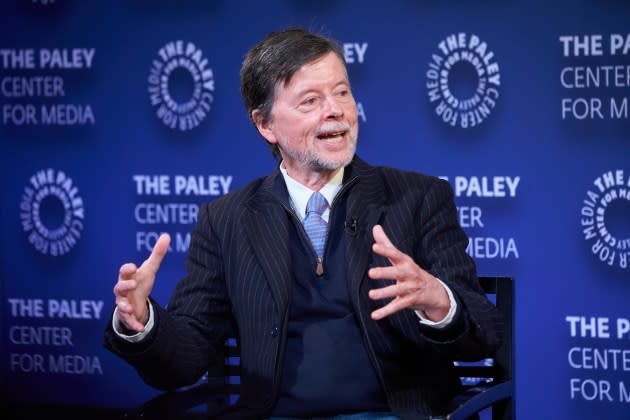Ken Burns On “Complicated Narrative” Of His Forthcoming Revolutionary War Project, Busting 1776 Myths And Looking Afresh At George Washington
- Oops!Something went wrong.Please try again later.
- Oops!Something went wrong.Please try again later.

Ken Burns, whose five decades of filmmaking have produced detailed portraits of presidents, wars, buffaloes and more, is about to take on a 21st century political lightning rod in the American Revolution.
His 6-part, 12-hour Revolutionary War project, already six years in the works, is slated to come out in 2025. While Burns encountered pockets of animus with his breakout historical work, The Civil War, in 1990, backlash at that time usually arrived via the U.S. Mail. Today, online vitriol flows freely across social media platforms, and the storm over the 1619 Project and other revisionist depictions of the birth of the country suggest that Burns could be next in the barrel.
More from Deadline
“We call balls and strikes,” Burns replied when asked if he expects objections to be raised by right-wing viewers. The Revolutionary era offers “a really complicated narrative,” as opposed to the air-brushed image of a group of Founding Fathers creating the country at the Constitutional Convention in Philadelphia, which Burns says “wasn’t true from the beginning.”
Burns made the comments during an hour-long conversation at the Paley Center for Media, which was deftly moderated by veteran Los Angeles Times media reporter and TV historian Stephen Battaglio. Longtime PBS CEO Paula Kerger also took part.
In weaving together the storylines of the series, Burns said he was struck by the “really wonderful” fact that “the people who won the war look exactly like America now.” The Continental Army included a number of Native Americans, freed Blacks, enslaved Americans, immigrants from Germany and Ireland, ex-convicts and women. North America in the 18th Century, Burns said, was “as diverse a continent as you could possibly imagine.”
As far as George Washington, Burns said, “He’s got lots of problems, right?” Yet he noted a key moment when an African-American scholar says on camera, “‘I really don’t believe in the “great man theory,” but I really don’t know we would be together without him.’ So, you can be waiting with bated breath to catch me at whatever you think is some violation of the code of the perfection of the Founding Fathers, but that’s a really good moment to have.”
A major topic during the discussion was how the media landscape has made collective viewing a rare phenomenon outside of NFL football games.
Burns and Kerger both expressed conviction that people will continue to want to have a shared TV experience. “Just like we want to stand together and sing the national anthem at a ballgame, or sing in a choir, we want to do things collectively,” Burns said. “That won’t end. The exigencies of television right now are changing.”
One emergent force leaves Burns far less optimistic, however: social media. “People talk about ‘social media.’ Social media isn’t. … Have you ever been in a room with teen-agers and they’re all on their phone? They’re not even talking to each other — or maybe they are, but through the texts. There’s something diabolically insidious about that sort of thing.”
Given the filmmaker’s wariness of digital technology, Kerger said with a chuckle that “talking Ken into streaming his programs was painful. … He wasn’t sure.”
The Roosevelts: An Intimate History in 2014 was the first time one of his PBS projects was released as a full series in streaming on the same night as its broadcast premiere. “We watched the numbers, and it was so interesting because what happened was there was a big audience the first night,” Kerger recalled. “You could see where people were coming into the streams and some of them were moving back into broadcast. They were catching up with their friends. …As much as we miss the fact that everyone was forced at 8 o’clock to watch together, there are other opportunities to meet people where they are.”
Best of Deadline
2024 Premiere Dates For New & Returning Series On Broadcast, Cable & Streaming
2023 Premiere Dates For New & Returning Series On Broadcast, Cable & Streaming
2023-24 Awards Season Calendar - Dates For Oscars, Emmys, Grammys, Tonys, Guilds & More
Sign up for Deadline's Newsletter. For the latest news, follow us on Facebook, Twitter, and Instagram.

